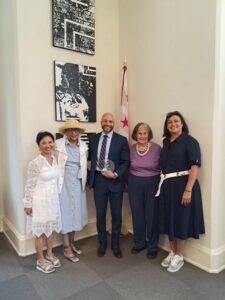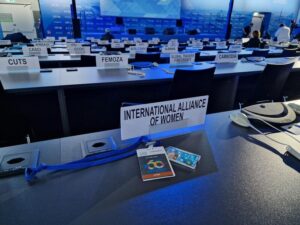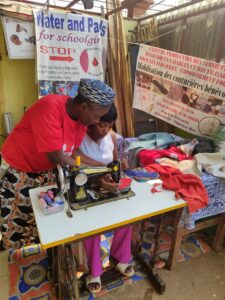The Canadian Federation of University Women continues the series on significant days to facilitate the conversation about the Sustainable Development Goals. Our purpose is to overlay a recognized Theme Day with the SDG lens in order to shine a light on and bring the conversation to the grassroots level.
We believe the elimination of violence can only be realized with the understanding that aggression against one woman is abuse against all women. The individual cannot be separated from the community and therefore national epidemics of violence have a global impact. Whether actors are enablers, bystanders or bullies, each act of violence against women has active perpetrators and conspirators who must be held accountable for attempting to diminish the personhood of the divine feminine.
For this si![]() gnificant Canadian National Day of Remembrance and Action to eliminate Violence Against Women the CFUW is intentionally making connections to SDG #4, #5, #16 and #17 (However, connections to any other SDG may be implied).
gnificant Canadian National Day of Remembrance and Action to eliminate Violence Against Women the CFUW is intentionally making connections to SDG #4, #5, #16 and #17 (However, connections to any other SDG may be implied).
This is the sixth feature in the series of nine Theme Days (Mother’s Day, Father’s Day, World Day to end Human Trafficking, International Literacy Day, International Day of the Girl Child, National Day of Remembrance of Violence Against Women – Canada, International Women’s Day, Earth Day, and 50/50 Day). This initiative provides a critical opportunity to discuss the interconnectedness of the SDGs to achieve gender equality and empowerment of all women and girls. We also aspire to highlight the intersectionality of women’s issues and the need to engage all stakeholders in the conversation.
The 2030 Agenda is for all, and achieving its goals requires action at all levels. In the spirit of the 2030 Agenda, contributors from diverse backgrounds have offered a perspective that we hope you can connect to and extend the conversation beyond your circle.
Cheryl Hayles, VP International Relations, Canadian Federation of University Women (CFUW), Regional VP North America, International Alliance of Women (IAW)
———————————————————————————————————————
It Has Been Twenty-Eight Years and What Has Changed?
Violence against women takes many forms: physical, mental, verbal, and sexual. In 1989, 14 young women were murdered, an event now referred to as “The Montreal Massacre”. At the time, the public expressed shock and outrage; something had to be done to prevent this type of thing from happening again. But, what has really changed since then? Not much apart from the fact that we now have a national day of remembrance. During the 28 years since that event how many Indigenous women have been murdered or gone missing? In most cases, authorities did not take the situation seriously. How many victims of sexual assault have not come forward because they fear being victimized again by the system and even by court officials themselves? This kind of behaviour on the part of males, even ones in positions of great responsibility, has become normalized as their bragging of their actions has been dismissed as “just boy talk”.
While we do have that day of remembrance, nothing will change until men form a bigger part of the discussion and they are made to see how their actions have affected their women victims.
Valerie Hume, Member of the International Relations Committee, (CFUW)
———————————————————————————————
We Remember December 6, 1989
Geneviève Bergeron, 21
Hélène Colgan, 23
Nathalie Croteau, 23
Barbara Daigneault, 22
Anne-Marie Edward, 21
Maud Haviernick, 29
Barbara Klueznick, 31
Maryse Laganière, 25
Maryse Leclair, 23
Anne-Marie Lemay, 22
Sonia Pelletier, 23
Michèle Richard, 21
Anne St-Arneault, 23
Annie Turcotte, 21



